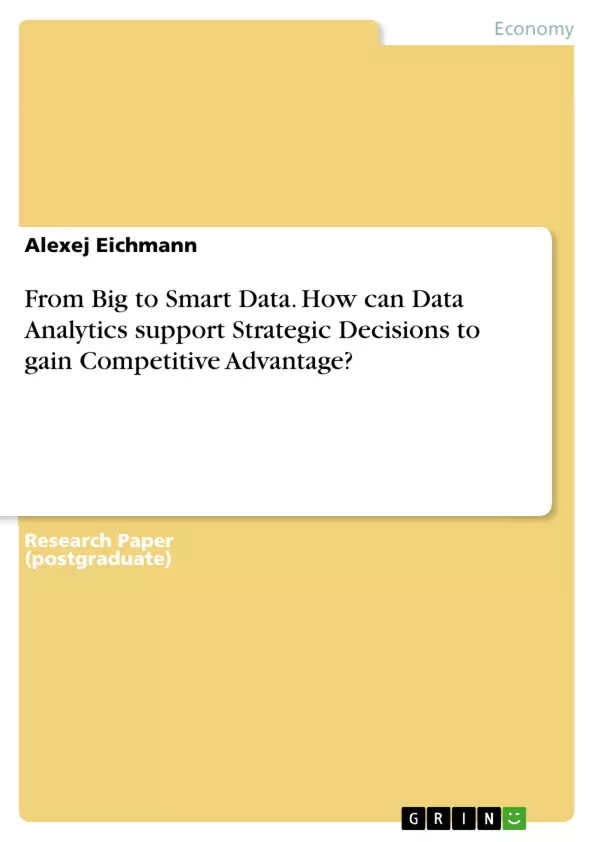One of the biggest challenges currently and in the upcoming years is the amount of data generated worldwide, which will increase exponentially by factor 10. The challenge for business leaders in the era of Big Data will be to identify and to use the most relevant data for decision-making in the context of Strategic Management.
This assignment analysis which relevance data analytics of Big respectively Smart Data nowadays has and how it can be utilized in enterprises to gain a higher degree of competitive advantage. Therefore a few selected examples and use cases are provided on the Corporate, Business and Functional level of Strategic Management.
Business leaders are using data analytics to understand cost and revenue drivers, to evaluate risks and to predict trends to improve business performance and to foster innovation. Studies show, that Big Data will revolutionize business operations and change the way of doing business. Companies not dealing with Big Data will lose their competitive advantage. With a deeper understanding of customers’ behavior and demands through analysis of Big Data, companies can find new ways to approach existing and potential customers by improved or new products. Criticism related to this is the debate about data security and data privacy and the misuse of personal data.
Inhaltsverzeichnis (Table of Contents)
- Executive Summary
- Table of Contents
- List of Abbreviations and Symbols
- List of Figures
- Introduction
- Problem Definition and Objective
- Scope of Work
- Background on Big Data, Smart Data and Strategic Management
- Definition and Objectives of Data Analytics
- Definition and Objectives of Strategic Management and Decision-Making
- Data Analytics as driver for Competitive Advantage
- Importance and Impact of Data Analytics for Strategic Management
- Data Analytics supporting strategic decisions
- Critical Analysis of the Data Analytics environment
- Conclusion and Outlook
- Bibliography
- Appendix A: ITM Checklist
Zielsetzung und Themenschwerpunkte (Objectives and Key Themes)
This assignment examines the relevance of data analytics, specifically Big Data and Smart Data, in modern enterprises and its potential to enhance competitive advantage. It explores how data analytics can be utilized across various levels of strategic management – corporate, business, and functional – to achieve organizational objectives. The analysis focuses on practical examples and use cases, emphasizing the importance of data analytics in understanding cost and revenue drivers, evaluating risks, predicting trends, improving performance, and fostering innovation.
- The growing importance and impact of data analytics in strategic management
- The utilization of data analytics in supporting strategic decisions across various levels of management
- The critical analysis of the data analytics environment, including potential challenges and opportunities
- The role of data analytics in improving business performance, fostering innovation, and gaining a competitive edge
- The ethical considerations surrounding data privacy and security in the context of Big Data and Smart Data analysis
Zusammenfassung der Kapitel (Chapter Summaries)
The introductory chapter sets the stage by defining the problem statement and outlining the scope of the assignment. It introduces the growing challenge of managing and analyzing large datasets in the era of Big Data, highlighting the need for effective data analytics solutions in strategic decision-making.
Chapter 2 provides a comprehensive overview of Big Data, Smart Data, and strategic management. It delves into the definitions and objectives of data analytics and strategic management and decision-making, laying the foundation for understanding the relationship between these concepts.
Chapter 3 explores the critical role of data analytics in driving competitive advantage. It examines the importance and impact of data analytics for strategic management, highlighting how companies can leverage data to gain insights into customer behavior, predict market trends, and make informed decisions. The chapter also explores specific use cases and examples of how data analytics can support strategic decisions at various levels of management.
Schlüsselwörter (Keywords)
Data analytics, Big Data, Smart Data, Strategic Management, Competitive Advantage, Decision-Making, Business Performance, Innovation, Customer Behavior, Market Trends, Data Privacy, Data Security, Predictive Analytics, Descriptive Analytics, Prescriptive Analytics.
Frequently Asked Questions
What is the difference between Big Data and Smart Data?
Big Data refers to the massive volume of raw data generated, while Smart Data is the result of filtering and analyzing that data to make it relevant for decision-making.
How can data analytics support strategic decisions?
It helps leaders understand cost and revenue drivers, evaluate risks, predict market trends, and gain deeper insights into customer behavior.
Why is data analytics crucial for competitive advantage?
Companies that utilize data effectively can innovate faster, optimize operations, and approach customers with better products, while those who ignore it risk losing their market position.
What are the three levels of Strategic Management discussed?
The assignment provides examples on the Corporate, Business, and Functional levels of management.
What ethical concerns are associated with Big Data?
The main criticisms revolve around data security, data privacy, and the potential misuse of personal information.
What types of analytics are mentioned in the keywords?
The text covers Descriptive, Predictive, and Prescriptive analytics as tools for business performance improvement.
- Citation du texte
- Alexej Eichmann (Auteur), 2015, From Big to Smart Data. How can Data Analytics support Strategic Decisions to gain Competitive Advantage?, Munich, GRIN Verlag, https://www.grin.com/document/309153



